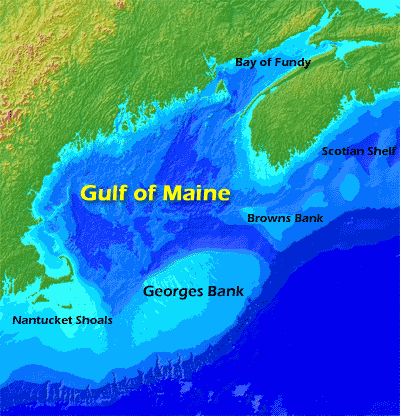Ecosystem Research Initiative for the Gulf Of Maine Area
There is a long history of research of ecosystem processes in the Gulf of Maine Area (GoMA). The area, like other ecosystems in the NW Atlantic, has experienced changes in species and community composition, substantial declines in some commercial species, and threats due to invasive species. In parts of the GoMA, total fish biomass has remained relatively constant since the late 1960s; groundfish biomass has declined while pelagic biomass and particularly that of elasmobranches has increased. Managers are asking to what extent these changes are due to exploitation or due to environment. They and stakeholder communities around the GoMA are also concerned for the overall cumulative impact of all human activities on the ecosystem and its ecological services. There is the added concern for the implications of climate change. The project augments Regional programs that provide the scientific basis for achievement of biodiversity, productivity and habitat-related objectives for an ecosystem approach to management in the GoMA through pursuit of three research themes:
- Influence of climate change on the oceanography and ecosystems of the Gulf of Maine and Georges Bank region - Climate change has large implications for Canada’s ocean ecosystems. This will be investigated through characterizing the link between the oceanography of the GoMA and the broader North Atlantic climate, and investigating how the GoMA ecosystems have responded and may respond in future to ocean climate. The impact of climate variability and change on connectivity among exploited populations (e.g. scallops) within the area will also be addressed.
- Spatial patterns in benthic communities - Managers in both Canada and the US are concerned with benthic habitats, their role in maintaining population productivity and biodiversity and their vulnerability to various types of perturbation. A study will therefore be undertaken to characterize and model spatial patterns in benthic communities, building upon work already underway in both countries.
- Quantification of the impact of ecosystem interactions on harvest rates and dynamics of commercially targeted (and non-targeted) species - As noted above, there have been large-scale ecosystem changes observed in the GoMA. The third theme will use a range of ecosystem models of GoMA to explore and further our understanding of these changes and their impacts, as well as contribute to decision making for Integrated Management.

Theme I - Influence of climate change on the oceanography and ecosystems of the Gulf of Maine and Georges Bank region
Background
Climate change has been characterized as one of the most pressing environmental issues humankind will face in the 21st century. The Canadian government has recognized this and understanding the science of, impacts and adaptation to climate change has been identified as a national priority for federal science departments. DFO Science has, in turn, included climate change science and impacts as an important element of its 5-year Research Agenda to address issues from the department’s climate change risk assessment initiated to evaluate impacts and vulnerabilities as they relate to SFA, HaPAE, SAW outcomes.
Project Elements
This project will address a number of the high risk ecosystem elements from that assessment. Relevant also to this project are the following observations:
- Climate change impacts is not a new issue for DFO − 20 years ago a study was conducted by DFO scientists to predict the changes that will occur in the oceanography of the Northwest Atlantic as the climate warms (Wright et al. 1986). A follow-on report discussed the potential impacts of these oceanographic changes on fisheries (Frank et al. 1990).
- Since those reports were written, considerably more information is known about climate change and its influence on global-regional oceanography, ecosystems and living resources.
- What is lacking is a clear understanding of how large-scale (global-regional) climate change can be down-scaled to predict local (e.g. GoMA: Gulf of Maine, Georges Bank; Bay of Fundy, Scotian Shelf) changes in environment and ecosystems.
This project will:
- characterize natural variability and trends of change in the oceanography, upper trophic, and plankton components of the ecosystems of the GoMA,
- explore linkages to the broader Northwest Atlantic climate system, and
- investigate the response, present and future, of the region’s ecosystems (plankton to fish) to climate change, including how key species will respond.
The ultimate goal of this project will be to understand better how climate change will affect the GoMA and provide the basis for better predictions (scenarios) of climate change and impacts on the region’s oceanography and ecosystems.
Citations:
Frank, KT, RI Perry, KF Drinkwater and WH Lear. 1988. Changes in the fisheries of Atlantic Canada associated with global increases in atmospheric carbon dioxide: as preliminary report. Can. Tech. Rep. Fish. Aquat. Sci. 1652.
Wright, DG, RM Hendry, JW Loder and FW Dawson. 1986. Oceanic changes associated with global increases in atmospheric carbon dioxide: a preliminary report for the Atlantic coast of Canada. Ca. Tech. Rep. Fish. Aquat. Sci. No. 1426:
- Date modified: